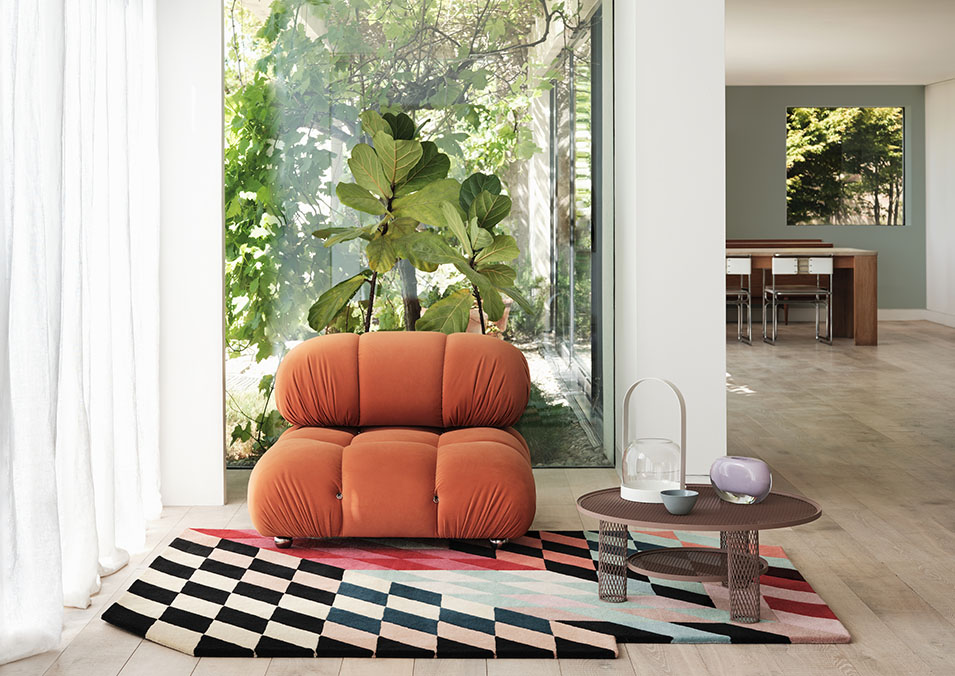The design of what’s underfoot has gotten bold, colorful and creative, writes Helen Parton
Kangan Arora’s Harlequin rug plays with optical illusion. Credit: Floor Story
“I was inspired by what was outside: the grasses, the clouds, the color of the skies,” begins photographer Douglas Friedman, describing the view from his desert retreat in Marfa, Texas, which formed the basis of his Atlas collection of rugs for the design studio of Kyle Bunting. The collection plays with the idea of circles and rectangles in its striking patterns. The colorways, influenced by the desert landscape, range from creams and burnt oranges to green, black and dark blue.
With the collection, Friedman joins a burgeoning raft of artistic visionaries expressing themselves through the canvas of rug design. Far from blending in underfoot, these rugs form bold artistic statements in the home, using graphic motifs and dramatic color palettes.
A rug from Douglas Friedman’s Atlas collection for Kyle Bunting. Credit: Kyle Bunting
Thousands of miles away on a quiet north London street, Sonya Winner runs her eponymous design studio. “Rugs have a massive effect on a room,” she says. “When you open the door to my home, the first thing you see is this statement of yellows, crimsons, reds, purples; lots of clashing colors.”
Her Sonia and Sonya rug collection perfectly embodies her design ethos, which in this instance took its cues from the colorful artwork by French artist Sonia Delaunay, co-founder of the early-20th-century orphism movement. Winner’s pieces feature circular motifs in bright hues of pink, blue, green, and orange, giving a sense of movement to an interior. “Some of my designs have more than 80 colors,” she says. “I’ve learned how to request a certain twist of yarn, so that it reflects the light in the way I want, even experimenting with tufting or knotting. I feel as if this is a crossover between art and design.”
CC-Tapis, an Italian design company producing handmade rugs, has been working with artists and designers for more than 20 years. Among its notable collaborators is Spanish architect and designer Patricia Urquiola; one of her many collections for the company, Venus Power, is characterized by cartoon cloud-like shapes with thick border lines, in color combinations of blue, pink and green.
Harlequin, a series of rugs by textile designer Kangan Arora for London-based company Floor Story, is dominated by a bold repeated diamond check pattern. “The starting point was an obsession with the geometric Indian cosmic yantras (astrological diagrams), the ‘Ichimatsu’ check pattern I learnt about during my travels in Japan, and the eye-catching graphics of modernist op art,” she says. “The color application is where things get interesting, with the ‘regular’ pattern deconstructed and reassembled.”
Patricia Urquiola’s Venus Power collection for CC-Tapis. Credit: Claudia Zalla
Garden Maze, a design from studio Campbell-Rey for Swedish textile firm Nordic Knots, features a grid-like pattern creating a three-dimensional play on perspective; an optical illusion in bold blue or green. It is one of three designs that the studio, run by Duncan Campbell and Charlotte Rey, has created for the company, taking cues from Nordic neoclassicism and expressing these in jewel-like colors. “Rugs offer everything you can possibly want in an artistic scheme—they sit at the intersection between art, craftsmanship, materiality and color,” says Campbell.
Rugs are increasingly not just reserved for floors, making a statement elsewhere in the home, too—displayed on walls or even used as headboards. “Some of our clients have started asking for a vertical solution,” says Kyle Bunting. “You might approach a rug from different angles, passing by or looking straight at it; it’s a completely different dynamic.” Winner also points to the positives of rugs as wall hangings: “They are really good for soaking up sound, something you don’t get with a piece of art. Rugs also have that beautiful tactile quality to them.”
The Garden Maze rug designed by Campbell-Rey for Nordic Knots. Credit: Nordic Knots
Freed from the constraints of neutral colorways or regular shapes, contemporary designers have let their creative energies flow with the modern rug. Whether laid on the floor or hung on the wall, rugs are now artworks in their own right, bringing a sense of intrigue and fun to the home—perhaps in unexpected ways.
